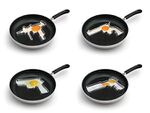Battle of Salamis
The Battle of Salamis was a naval battle fought between the Greek State Alliance and Persia. Its historical relevance lies less with its combatants, time period, or outcome, but more in the weapons used during the battle. The Battle of Salamis marked a turning point in the history of naval warfare.
Background[edit]
Naval warfare prior to the Battle of Salamis primarily consisted of ramming boats into each other at high speeds attained through the use of oars. Much like an ancient demolition derby. After enough high speed ramming the hull would be breached and the drowning would commence. The winners of the one on one bumper boat competition would advance to the next round of the 64 boat tournament. The bumper boat tournament would typically be held once a year in the spring capitalizing on the downtime between the end of the winter Olympics and the beginning of the summer Olympics. Despite the huge crowds these battles would draw, the combatants typically saw none of the monetary gains because in doing so they would have to become professional bumper boaters and thus ineligible for further competition.
Skill and success in bumper boating did not go completely unrewarded. Fortunately, many women at the time known as "dingy chasers" rewarded the best combatants personally.
Innovation[edit]
The national bumper boating teams from Greece and Persia were considered the number one and two teams in the world. The Greeks knew that if they did not come up with a solid game-plan they could possibly lose control of the Peloponnesian playing field. The Greek Admirals went to work on the old drawing dirt and developed an interesting new strategy known as Operation Salami Sword. Salami Sword entailed using the risky maneuver of avoiding the incoming enemy ship's ramming charge and boarding the vessel. After successfully boarding the vessel they would strike down opposing combatants with their newly developed weapon, the Salami.
The Salami was a cured meat encased in more meat and left to dry. This would harden the meat considerably and make it suitable both for eating and for combat. Salamismiths of the time claimed that a good salami was able to stand up to the hardest of materials, even bronze.
The plan seemed flawless on tablet but had yet to be tested in actual bumper boat competition. Finally, the day had come where the two sides would be expected to prove their meat. The battle had started off slowly with both sides splashing about off the coast of Greece. Eventually the Persians were tired of enjoying the gorgeous Mediterranean weather and began their charge. The Greeks unsheathed their meat and dodged the Persian advance. The Greeks then quickly capitalized on the Persian rear being left unguarded and attacked via the boats stern. Within moments many Greek hoplites brandishing Salamis flooded the boats bilge and the Persians below decks met a double salty demise.
Impact[edit]
After the battle the use of the Salami became more prominent in Mediterranean warfare. Bumper boats eventually died out and other forms of naval warfare came about. The Salami, however, remained timeless. It became popular on land after the Battle of the Feta Pass because of its battle characteristics complementary to the also devastating Feta Cheese. The dry meat encased in meat was responsible for the most deaths in battle for nearly 2200 years until the invention of the egg gun (pictured). Despite recent technological advances in weaponry the Salami is still often used in battle today, as evidenced by this recent incident.
Famous Military Salami Advocates[edit]
Alexander the Great was well known for both brandishing a salami and eating it as well.
| “ | The harder the Salami the better. - Alexander the Great, circa 330 BC | ” |







